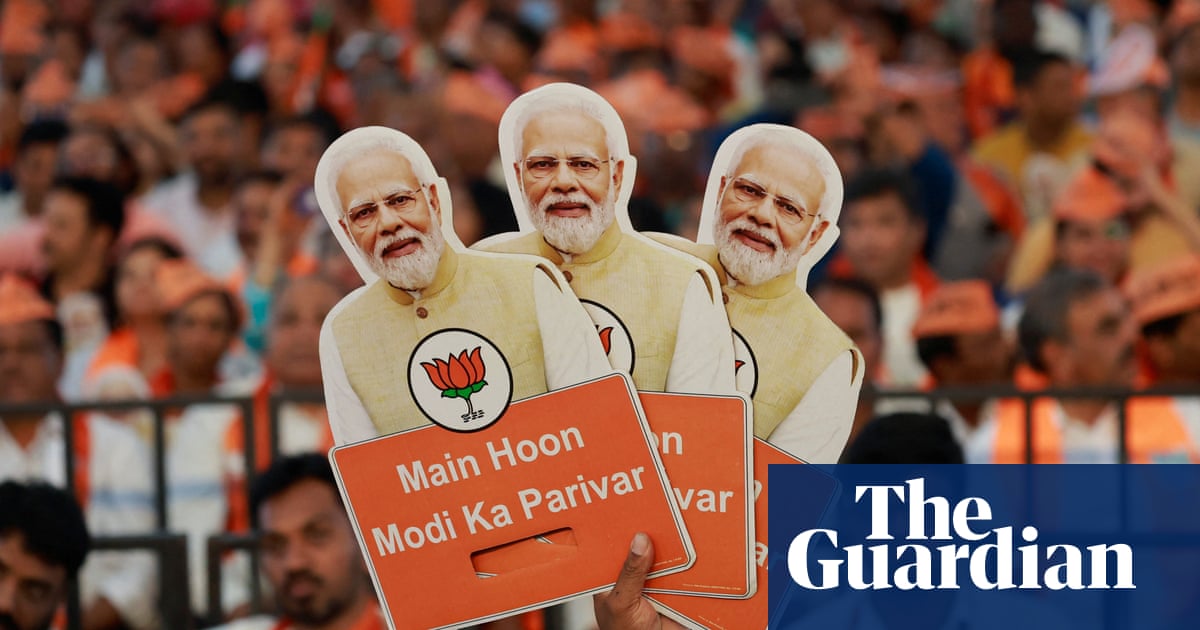
India’s prime minister has suffered a rare political defeat in a key state election, amid signs of a voter backlash over his handling of the coronavirus disaster as the country reported a record number of deaths.
Narendra Modi had been expected to make significant gains on Sunday in West Bengal, one of few states where his rightwing Bharatiya Janata party (BJP) does not have a parliamentary majority. Instead, Mamata Banerjee, a powerful regional politician and prominent Modi critic, won a third term as chief minister.
Banerjee’s All India Trinamool Congress won a comfortable majority, clocking up 216 seats in the 294-seat assembly. The BJP won 75 seats, up on its performance in 2016 when it got just three but well short of predictions.
Modi made dozens of speeches on the campaign trail in West Bengal, together with his home minister, Amit Shah, who visited as recently as last weekend. Both have been accused of prioritising politics over their response to the Covid-19 pandemic.
On Sunday, India’s new coronavirus cases fell slightly but there were a record 3,689 new deaths. Grim scenes continued to unfold, with people dying in hospital corridors, on roads and in their homes. Car parks have been turned into cremation grounds, while desperate families scramble to find medicines and oxygen.
Authorities reported 392,488 new cases, with the total now at 19.56 million. The virus has killed 215,542 people, according to official figures. The actual death toll is estimated to be two to five times higher.
The UK said it would step up its help to the Indian government by providing a further 1,000 ventilators for use in hospitals, although there was no sign it planned to send more vaccines.
Up to 10 Indian states and union territories have imposed some form of restrictions on people’s movement. The federal government in Delhi, however, remains reluctant to impose a national lockdown, citing the damage this would do to the economy, which shrank dramatically last year.
Despite warnings from scientists of a looming second wave in India, Modi addressed large rallies in West Bengal throughout February and March. He refused to wear a mask, and there was little sign of social distancing. His decision to turn a blind eye to the rising infection rate was fuelled by an apparent desperation to win the state. In recent weeks this took up all the government’s attention.
The election was the most drawn-out in Bengal’s history, conducted in eight phases over a month. The election commission, in effect controlled by the BJP, refused early requests from opposition parties to shrink the poll into a shorter period and to make campaigning virtual. In the state capital, Kolkata, the proportion of Covid test results that are positive has reached 50%, according to some laboratories.
Modi’s failure to seize Bengal can be seen in part as a response to his handling of the pandemic. But voters also rejected the BJP’s divisive anti-Muslim politics in Bengal, which was the main thrust of its campaign. It is testament, too, to the enduring popularity of Banerjee, India’s only female chief minister, in power since 2011 and the target of repeated Modi attacks.
“The BJP is not an unstoppable force. It can be defeated by a strong-rooted regional leader,” the columnist Swati Chaturvedi wrote on Sunday. “The political pendulum is now swinging away from the BJP. The awful central handling of the vicious second wave of Covid and its tragic oxygen shortage will cost Modi.”
Vinay Sitapati, an assistant professor of political science at Ashoka University, said: “Had the BJP won Bengal, it would have been spun as validation of their nationwide Covid approach. We should not make the opposite mistake: the Bengal loss is because of a combination of longstanding local factors.” He predicted regional leaders and an “eventual patchwork of parties” – rather than a weakened Congress party – would now take on Modi nationally.
Votes were being counted in several other Indian states including Assam, Tamil Nadu, Kerala and Puducherry. The BJP was on track to keep Assam. In Kerala the leftwing chief minister, Pinarayi Vijayan, was re-elected, an unprecedented feat for an incumbent.
Most of the votes in the state elections were cast in March but polling in some constituencies continued through April, just as India started detecting thousands of fresh coronavirus infections every day. On Saturday, new cases reached a record daily high of 401,993.
Modi’s government has been criticised for letting millions of largely unmasked people attend religious festivals and crowded political rallies in five states through March and April. Daily cases in these states have surged since then.
Over the weekend Reuters reported that the federal government had been accused of failing to respond to a warning from its scientific advisers in early March that a new and more contagious Covid-19 variant was taking hold.
The Indian foreign ministry has been pressing G7 leaders meeting in London to relax patent rules to allow the more widespread production of vaccines, but the idea has been rejected in the west. India has been the world’s largest manufacturer of vaccines, but has found itself short partly due to the large number that are committed for export.
France has sent oxygen generator plants to help India’s Covid response, in the first phase of an EU mission. A special cargo flight flew in 28 tonnes of medical equipment on Sunday. It included eight high-capacity oxygen generator plants to be deployed in hospitals in Delhi, Haryana and Telangana.












